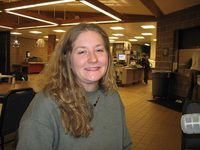Katie Higsten, 22, is looking for her keystone species, a species which — were it to become extinct — would lead to the extinction of other forms of life. She’ll probably end up researching such things in a warmer climate than Ely or even Minnesota. “When it gets to 60 below here, people get laid off,” she told me during a visit at Vermilion Community College in Ely, where she enrolled in the wilderness management program.
“If you look at the ecological development of an area, what would be the most important. If something dies out as the result of another species? It continues up and down along the food chain. What species are being threated by global warming?”
The Montana native — who’s lived in Hibbing, Duluth and Woodbury — obviously wants to know everything about nature and has a plan for learning it.
“I have so much school left,” she said, just before I reminded her that we’re supposed to look at things in little pieces. “If you think about the little pieces of every school I’ve done, I want to do history, archeology, and then move on to life sciences like biology and by then I will have a pretty good idea what species I want to specify and I want to go into ecology.”
She just returned from a trip to Australia, where she and a colleague surveyed people about their role in the environment, but where she became fascinated with grasshoppers. “It was amazing to me the different grasshoppers that are around the world. They live in all the climates of the world. I don’t think they’ll be a keystone species, but they’re interesting.”
But they’re not something she’ll likely make a career out of. “Bugs are important, but at the same time they gross me out,” she said.
She completed a two-year program at Vermilion in a year, and she still has more courses to take on her search for her career and her keystone species. That’s where the economy has turned bruising for her.
“I had to take student loans for every class; I live off student loans. Because I did business school already, I was $10,000 in debt from Duluth Business University and when I am done here I’m going to be about $40,000 in debt,” she says.
Her parents are worried about the banks, “especially since I took one out with Wells Fargo. I’m pretty much getting to the end of the line with what banks will lend to me.”
She hopes to start working the Forest Service this summer, but probably not in Minnesota. “Everything up here is temporary.”
Higsten doesn’t see a disconnect between her outlook and the nation’s as a whole. “I think my economy will work itself out. i try to manage my money as best I can. I think the economy as a whole is the same way. Bailing the banks out is the same way that they had the stimulus package for everyone. They sent us $300 and it was gone in a second. I don’t know if that makes us a Socialist society, but that might not be a bad thing if it comes down to our survival. People are starting to understand they can’t spend their money so frivolously and (should) enjoy the finer things in life because that’s what life is all about. Some people haven’t had that sink in yet.”

